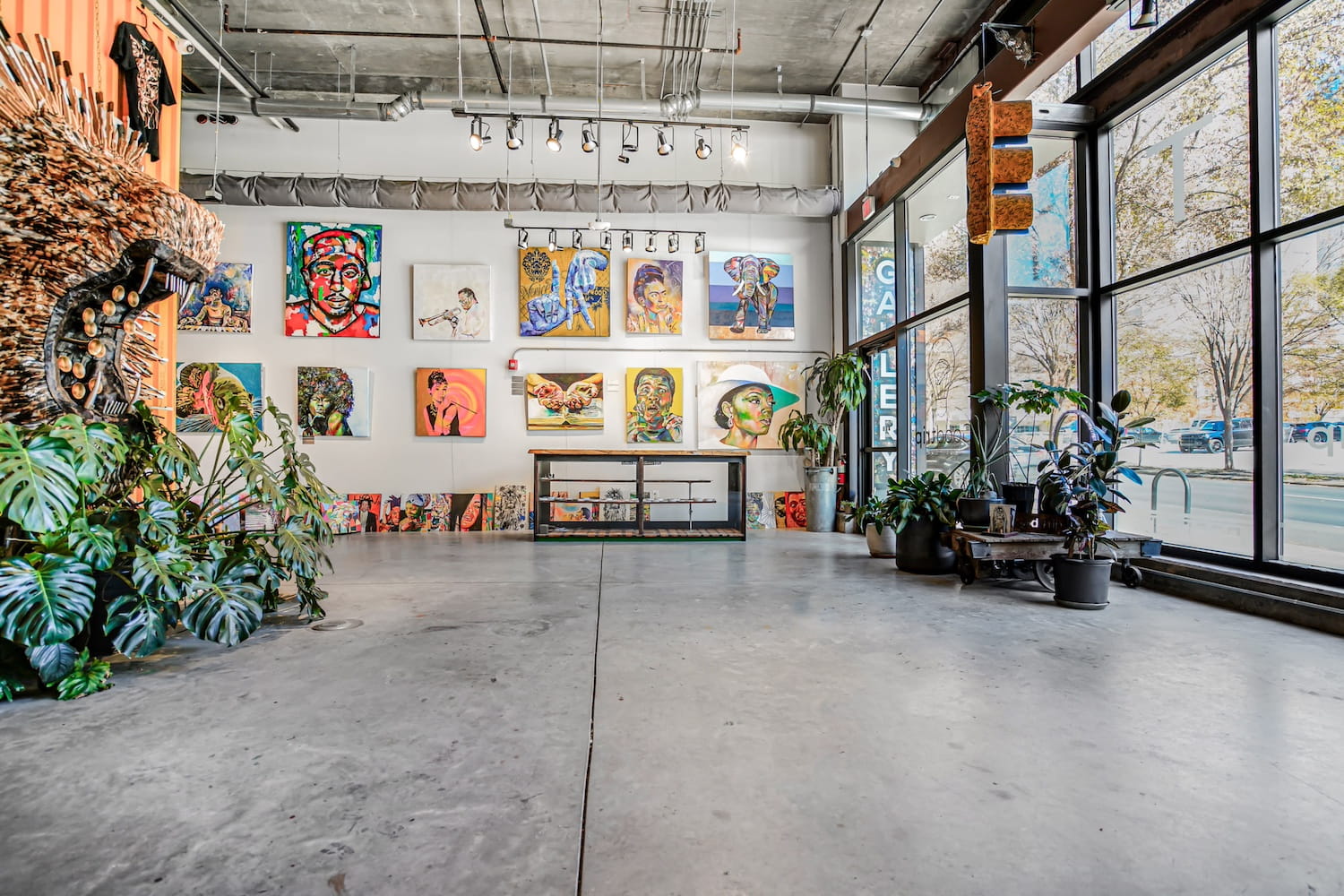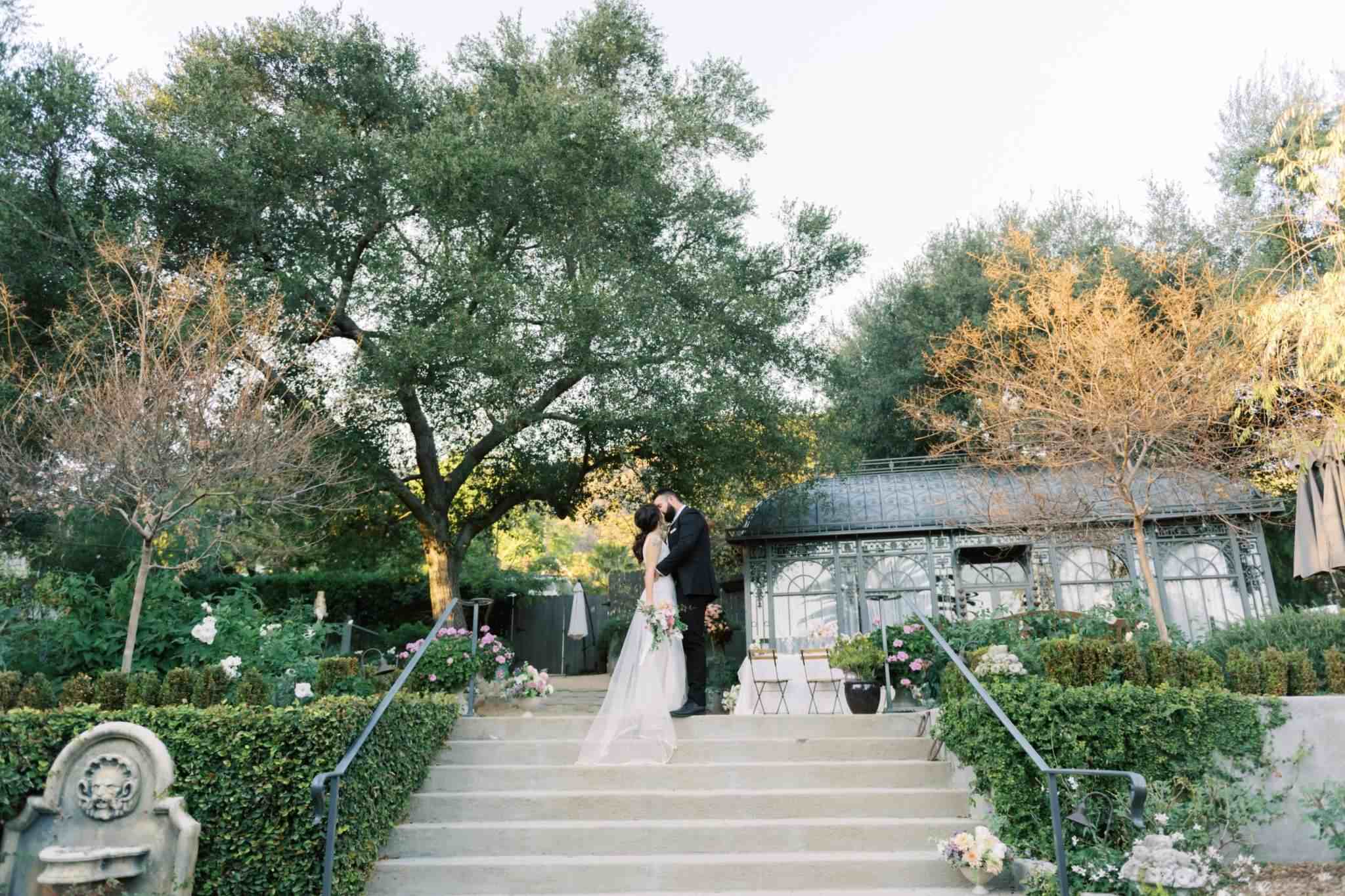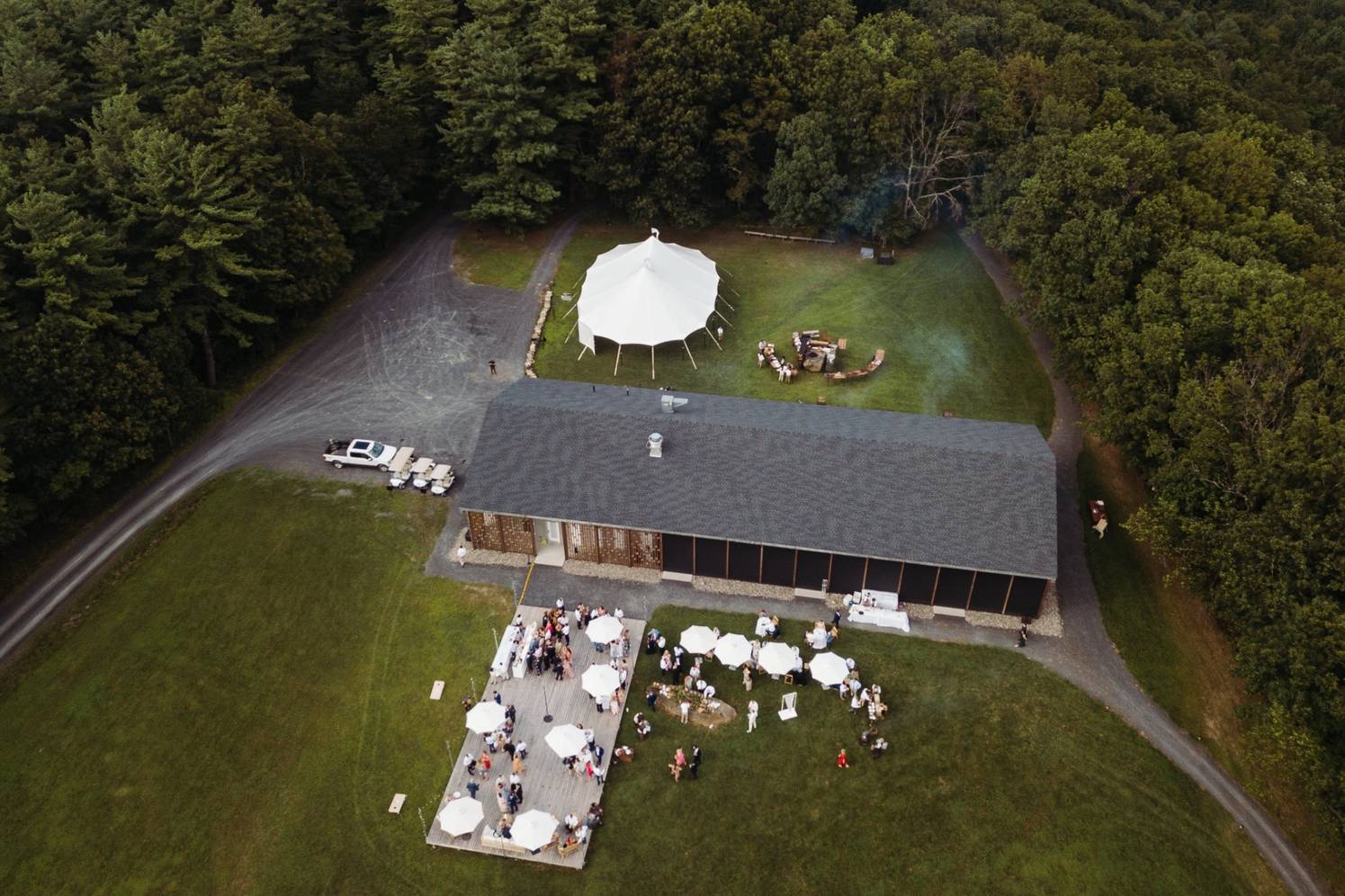How & Where to Rent an Airbnb for a Wedding Venue in North Carolina (2026)
-

Lead Editor & Publisher
- October 3, 2025
- 14 min read
- Events
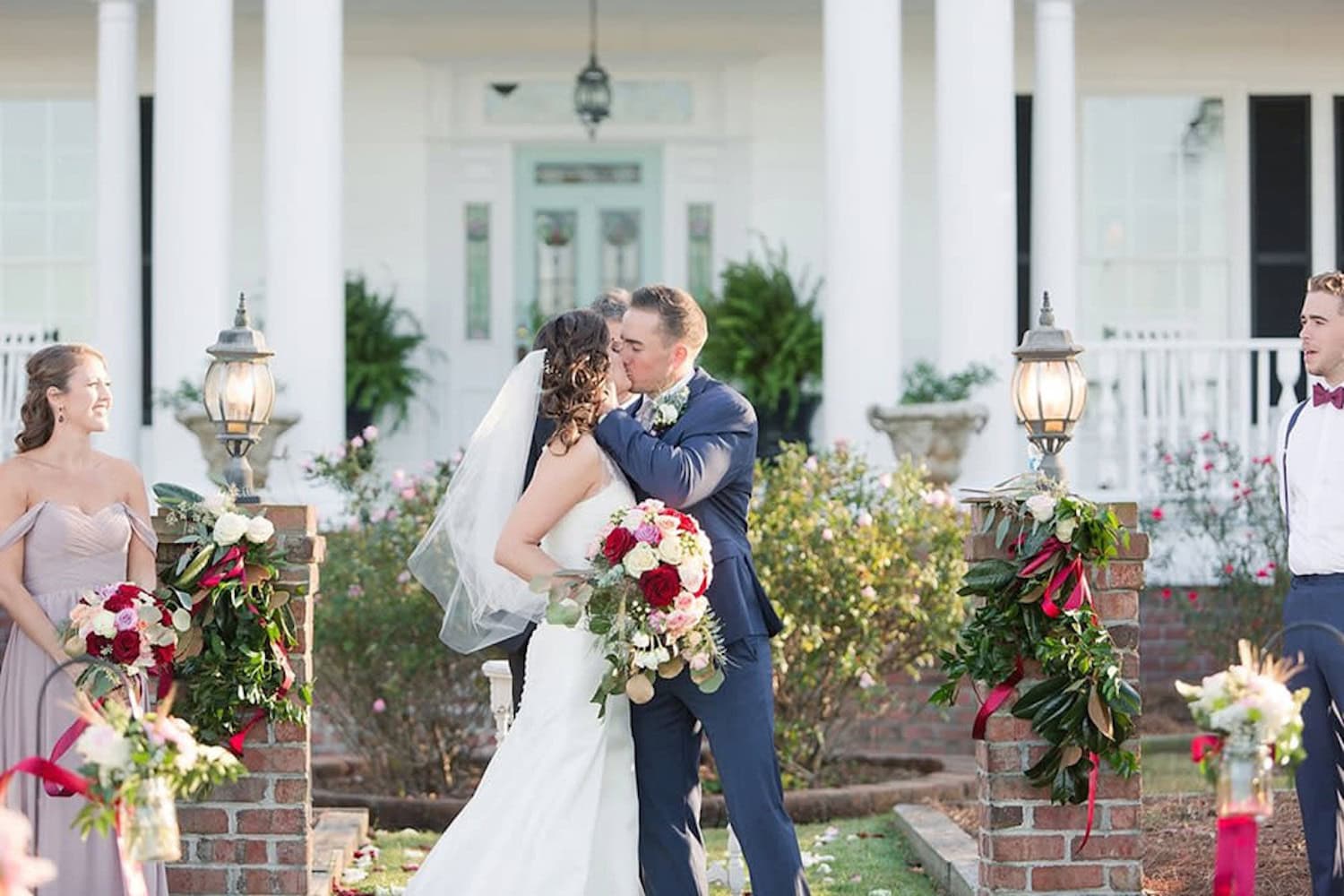
Source: Peerspace
North Carolina is one of the most versatile wedding destinations in the country, offering everything from mountain views that stop guests in their tracks to coastal breezes that turn a ceremony into a once‑in‑a‑lifetime experience. Couples can choose rustic barns in the foothills, historic homes with Spanish moss‑draped courtyards, or sleek rooftops overlooking city skylines, all in one state. Yet while the scenery is breathtaking, the logistics of wedding planning can quickly become overwhelming. When couples start their venue search on Airbnb, what looks dreamy in photos often turns into logistical headaches and mounting costs. Rules about noise, vendor access, or guest capacity can cut into your plans before they even begin.
This guide breaks down why Airbnb weddings in North Carolina can be risky, and why purpose‑built event spaces on Peerspace give you more freedom, transparency, and value. Along the way, you’ll get a detailed look at regional wedding styles, timelines that beat weather and traffic, and insider planning strategies that make your day run smoothly. Think of it as your map to enjoying all of North Carolina’s beauty without stumbling into hidden hurdles.
Table of contents
- How Airbnb falls short
- Why Peerspace wins the North Carolina wedding game
- Wedding vibe by NC region
- Hour-by-hour wedding day playbook
- Local flavor reception ideas
- Make it a wedding weekend
Why Airbnb falls short for wedding venues in NC
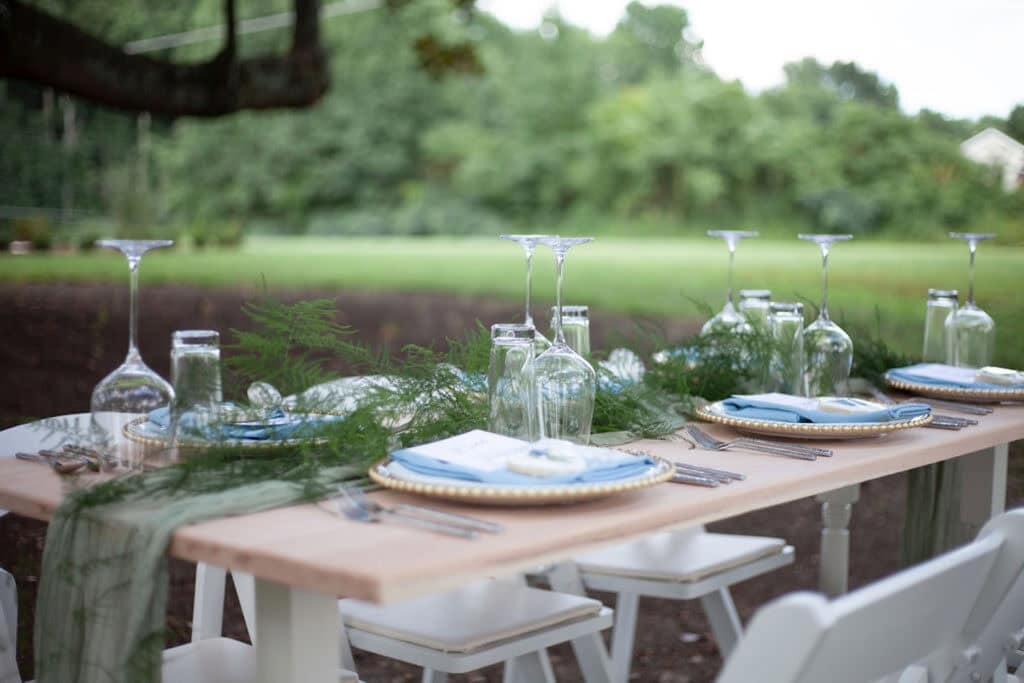
Airbnb listings in North Carolina promise cozy cabins, chic lofts, and beachfront cottages. The images often show panoramic mountain sunsets or ocean‑side decks framed with string lights. But behind the glossy photos are strict event rules, neighborhood ordinances, and infrastructure gaps that quickly derail wedding plans, and spiral into a logistical quagmire that leaves couples scrambling.
Event bans and guest caps
Airbnb has a platform‑wide restriction on parties and events, which means many listings explicitly ban weddings. Even if you find a host willing to bend the rules, you’re likely limited by low guest caps designed for small gatherings, not 100‑person receptions. North Carolina’s popular Airbnb cabins in Boone or cottages in Wilmington might advertise space for 8–12 guests, but hosts often draw a hard line at anything resembling a wedding. This forces couples to either break rules (risking eviction mid‑event) or cut their guest list far below what they envisioned.
Paying for pillows you don’t use
Most Airbnbs require two‑to‑three‑night minimum bookings, plus service and cleaning fees. If you’re only using the property for a single afternoon and evening, you’re essentially paying for empty bedrooms that your guests will never see. In prime locations like Asheville or the Outer Banks, nightly rates skyrocket during peak wedding season, so couples end up spending thousands of dollars for accommodations they never intended to use. That money could instead fund a better photographer, live band, or gourmet menu.
Vendor restrictions vs. your vision
Hosts often restrict outside catering, DJs, or décor setups. That means your favorite BBQ pitmaster, bluegrass band, or food truck might not be allowed on site, undercutting the very details that make a North Carolina wedding feel like yours. Even when vendors are technically allowed, logistical restrictions like delivery windows, parking limitations, or kitchen access can create major stress. Imagine planning a seafood boil on the coast only to learn that the host’s rules forbid propane burners.
Neighbors, noise, and quiet hours
From suburban cul‑de‑sacs in Charlotte to fragile dunes in the Outer Banks, neighbors are quick to complain about noise or parking. Quiet‑hour rules often force receptions to shut down by 10 p.m., cutting off dance floors just as the party hits its stride. In mountain regions, sound carries across valleys, so even moderate music volume can draw complaints. Coastal areas bring added restrictions from local patrols, leaving couples constantly looking over their shoulders.
Homes aren’t wedding‑ready
Many NC Airbnbs lack the basics: multiple restrooms, parking for vendors and guests, or commercial kitchens for catering staff. In mountain areas, septic systems can’t handle large crowds, while coastal rentals may have little space for tents or generators. Without these essentials, couples face last‑minute rentals of portable restrooms, power generators, and shuttle services, quickly erasing any perceived savings.
Instead of risking your wedding on fine print and fragile logistics, you can choose venues built with events in mind.
Why Peerspace wins in North Carolina
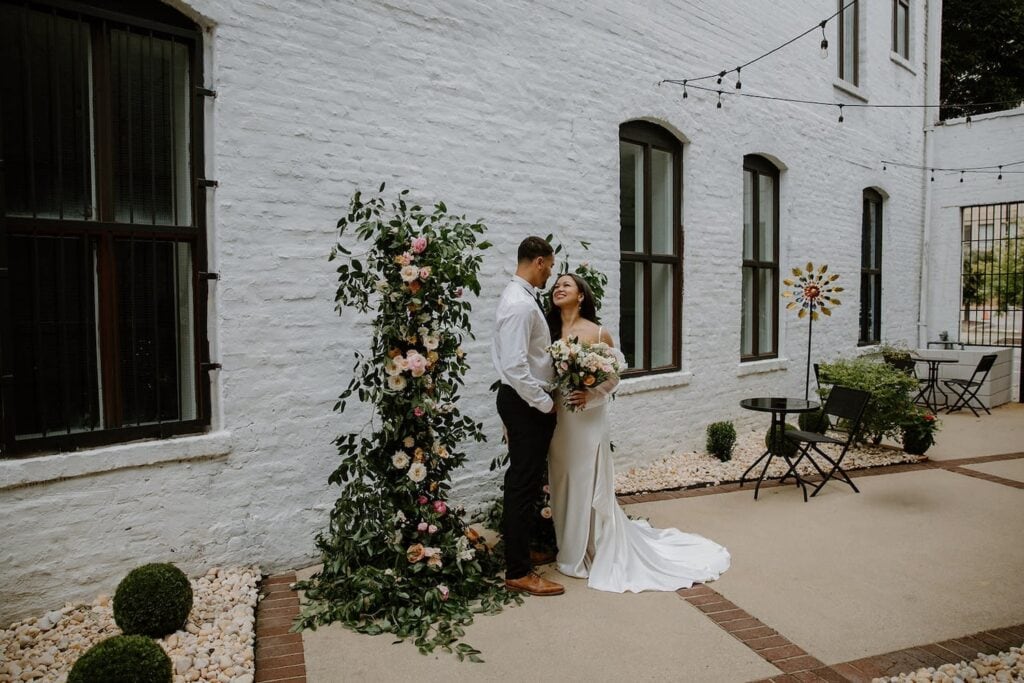
Instead of gambling on a residential rental, Peerspace offers event‑ready venues that are designed for weddings from the ground up. With hourly pricing, transparent rules, and the freedom to bring your own vendors, couples can focus on designing the day they’ve envisioned rather than dodging restrictions. Peerspace lists spaces that are legally permitted, practically equipped, and aesthetically stunning.
Pay for the party, not the pillows
Instead of multi‑night minimums, Peerspace lets you book by the hour. That means you pay only for the ceremony, reception, and setup time you need, not empty bedrooms and overnight stays. The savings are significant: an eight‑hour venue rental may cost less than one peak‑season Airbnb night.
Wedding‑ready infrastructure built in
Many Peerspace venues come with multiple restrooms, prep kitchens, AV systems, staging areas, and parking plans. These built‑in amenities save money and reduce stress compared to modifying a residential home. For example, a renovated mill in Durham might already have a stage, dance floor, and professional lighting, while a coastal garden includes shaded seating and rain‑plan tents.
Your vendors, your way
Want Lexington‑style BBQ, a mariachi band, or a local brewery on tap? With Peerspace, outside vendors are welcomed instead of restricted. Couples gain creative control without hidden pushback. This flexibility allows you to mix traditions. Imagine a wedding where Southern BBQ meets vegan small plates, all capped off with a late‑night biscuit bar.
Clear capacity and costs up front
No surprise cleaning fees or vague rules. Peerspace venues list capacities and policies clearly, so you know exactly how many guests can attend and whether you can serve alcohol before you book. This upfront transparency helps with accurate budgeting and stress‑free planning.
Local hosts who know the terrain
Hosts often guide couples through permits, shuttle logistics, and seasonal considerations. Whether you’re navigating hurricane season in Wilmington or fall traffic in Asheville, a local host’s insight is invaluable. Many also provide insider recommendations for photographers, florists, or officiants.
When you choose Peerspace, you choose clarity, flexibility, and a venue designed to make your day seamless rather than stressful.
Pick your North Carolina wedding vibe by region
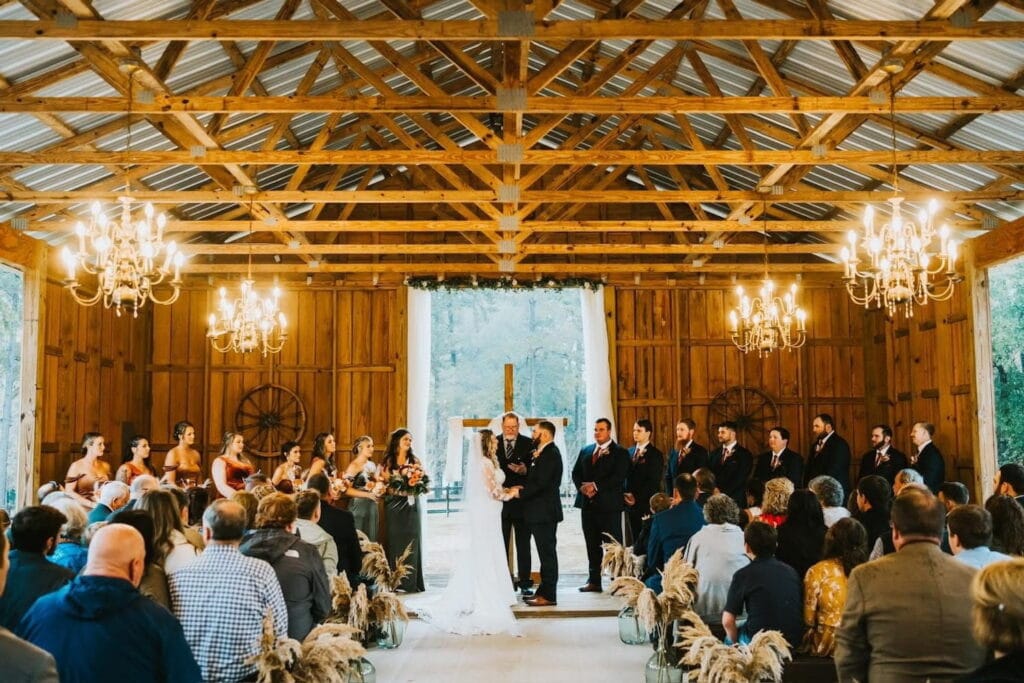
Every region of North Carolina offers unique flavors, logistics, and cost considerations. Picking the right location is as much about guest experience as it is about scenery. Choosing well can mean the difference between an easy weekend for guests and a stressful marathon.
Asheville and the Blue Ridge
Mountain lodges, vineyard barns, and breweries offer rustic elegance framed by breathtaking scenery. October is peak season, but couples who book in early spring or late fall often find lighter traffic and more budget-friendly rates. Scenic overlooks double as photo stops and can be worked into the schedule with minimal travel.
Charlotte and Lake Norman
Charlotte’s uptown lofts with skyline views provide modern flair, while Lake Norman estates allow for waterfront ceremonies. The city’s booming food scene gives couples an endless list of catering options, from upscale Southern to global fusion.
Raleigh–Durham–Chapel Hill
Historic estates with grand porches, sleek studios with modern lines, and university-adjacent venues make the Triangle versatile. Its central airport hub and robust vendor base make logistics smoother for large guest counts.
Wilmington and the Cape Fear Coast
Garden courtyards, historic mansions, and riverside lofts bring coastal charm. Hot, humid summers require backup cooling measures. Think shaded seating, fans, or indoor cocktail transitions.
Outer Banks (OBX)
OBX offers oceanfront decks, dunes, and piers with postcard-worthy views. That beauty comes with planning challenges: steady winds, shifting tides, and town permit requirements. Couples who prepare with sturdy décor and contingency plans enjoy smoother celebrations.
Greensboro and Winston-Salem
Midpoint locations with warehouse-style venues and botanical gardens work well for couples with guests spread across the state. The Triad is often overlooked, which makes it easier to find availability and competitive pricing.
When you align your wedding region with your style and guest needs, the entire event flows more naturally, and often more affordably. It also lets you frame your day with experiences that highlight the best of that corner of North Carolina.
The hour-by-hour North Carolina wedding day playbook
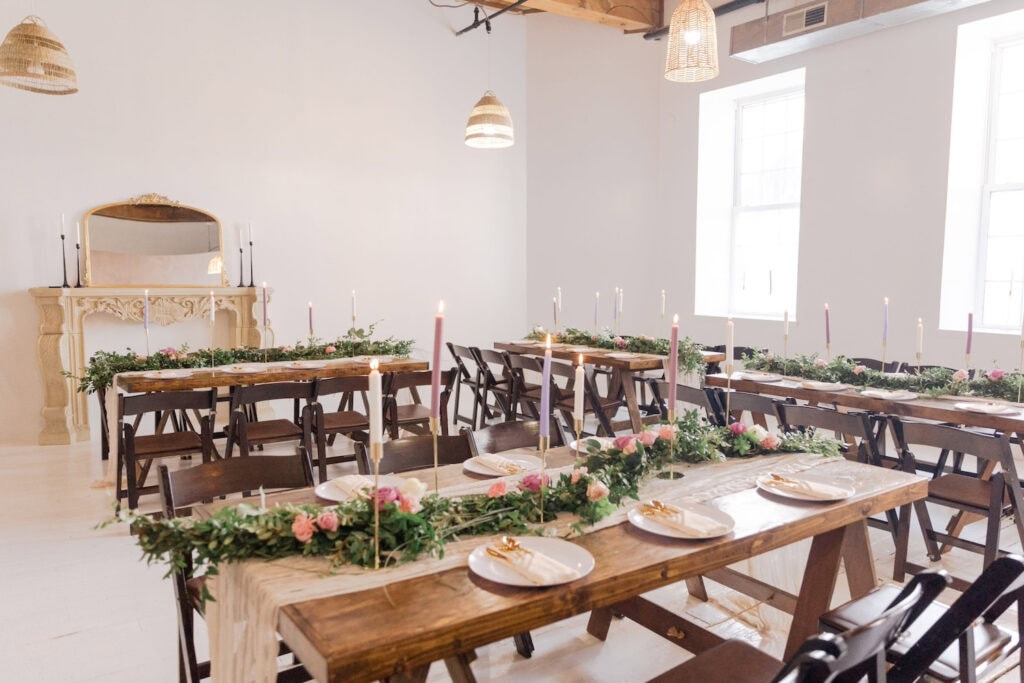
North Carolina weddings unfold across mountains, coasts, and cities, and each landscape shapes the rhythm of your celebration. The right timeline doesn’t just keep things on track; it sets the mood, builds anticipation, and gives guests a seamless experience from start to finish. From sunrise setup to late-night bites, here’s how to map out a wedding day that balances structure with flexibility, while staying true to the state’s unique quirks.
Sunrise setup: vendor arrivals and coffee in hand
Allow vendors adequate time to load in. In mountain towns with steep driveways, this can mean an extra hour. Coastal venues may require protective mats to keep sand out of equipment. Share a simple site map in advance showing power drops, water access, staging tables, and rain-plan locations so each vendor lands in the right spot without asking you a single question.
Late morning: getting ready without chaos
Prep rooms should have good lighting, mirrors, garment racks, and snacks. Assign one point of contact to manage hair, makeup, and photography schedules, so no one feels rushed. Keep a “must‑shoot” list limited to 10–12 frames for the photographer. Fewer, better shots buy you breathing room and avoid timeline creep.
Having the right photographer can make this whole process easier. These are the best questions to ask a wedding photographer to make sure you find the right match.
Early afternoon: guest arrivals and pre-ceremony ease
Guests often arrive early. Offer welcome drinks, shaded waiting areas, sunscreen/bug spray baskets, and clear signage for parking and seating. A 10‑minute buffer before processional music keeps you on time without feeling hurried.
Ceremony: keep it comfortable and audible
Check audio in advance, especially for outdoor ceremonies where wind or water can distort sound. Ensure aisle seating is stable for grassy or sandy surfaces and provide water stations nearby. If you’re writing personal vows, ask your officiant to cue pauses so your photographer captures reactions naturally.
Golden hour portraits: the magic window
Work with your photographer to identify specific spots (mountain overlooks, coastal piers, or garden trellises) for a golden-hour session that maximizes natural light. Build a shot order (family first, wedding party next, couple last) and designate a “photo wrangler” who knows everyone by name.
Dinner service: pacing the meal
Coordinate with caterers to balance timing between speeches, meal service, and toasts. Poor pacing can leave guests restless; a smooth cadence keeps energy high. For family‑style, pre‑set salads and bread; for buffets, open two lines mirrored on both sides to cut wait times in half.
Evening entertainment: smooth flow from dinner to dance
Kickoff dances and two back‑to‑back high‑energy songs get people on the floor. Add a modern twist to any bouquet/garter swaps (open dance shout‑outs, anniversary dance) so momentum never dips. If your venue has outdoor space, light paths clearly to pull people back inside for key moments.
Late-night bites: fuel the dance floor
Offer handheld options like mini hush puppies, pimento cheese biscuits, or fried hand pies to keep energy up. Plan for 40–50% of your guest count for late‑night snack quantities. Usually the rest will still be full from dinner.
Sound checks, emergency kits, and weather pivots
Bundle these details together to reduce fragmentation: check sound systems in advance, stock an emergency kit with essentials, and prepare micro‑timelines for both sunny and rainy scenarios. Small steps like these make your celebration flexible without slowing the day’s pace.
Vendor strike and load‑out logistics
Confirm loading zones and latest pickup times for rentals. Stagger strikes (band first, catering second, rentals last) so doorways don’t bottleneck. Assign one person to collect personal items (guest book, gifts, leftover favors) into a labeled bin.
Time buffers that save the day
Build 10–15 minute cushions after ceremony, after portraits, and before toasts. Those small buffers absorb hiccups so the evening still lands exactly on time.
A timeline crafted with intention ensures your wedding feels like a celebration, not a checklist. When each hour has a clear purpose (and a backup) you stay present while the day runs itself.
The BBQ, bluegrass, and local‑flavor reception playbook
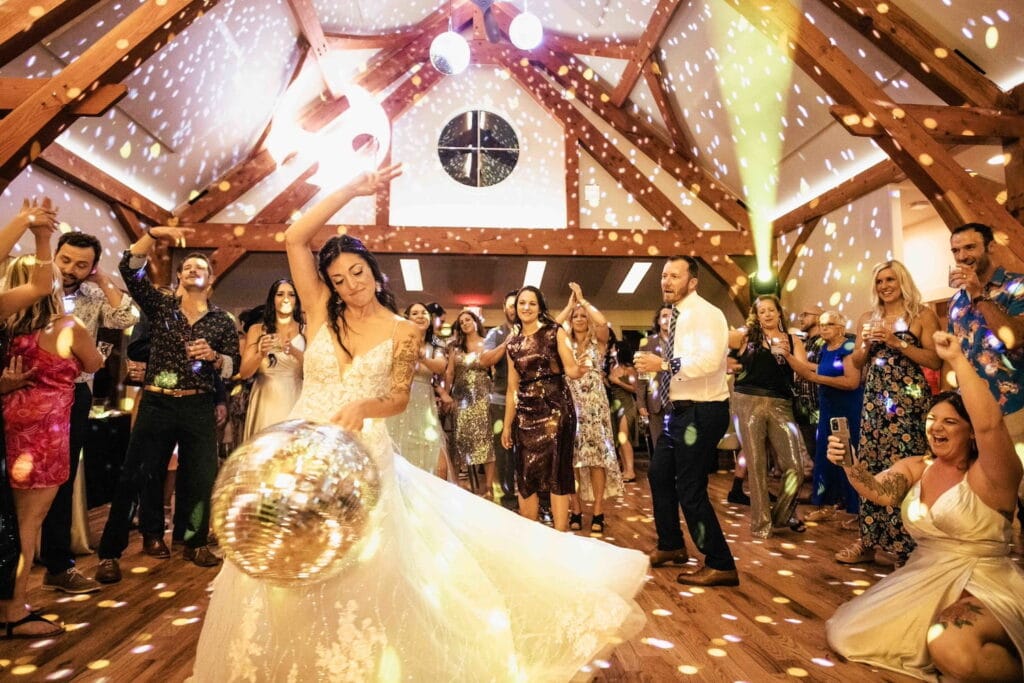
Food and music define North Carolina culture, and weaving them into your wedding makes the event remarkable. A reception steeped in local flavor is both budget‑friendly and deeply memorable. Beyond menus and playlists, it’s a chance to tell a story about where you are and who you are.
Menus that sing “Carolina”
Feature Lexington vs. Eastern BBQ stations, shrimp and grits bars, Cheerwine cocktails, and cider‑donut late‑night snacks. These touches tie your menu to NC traditions. Add interactive stations like biscuit bars or build‑your‑own mac and cheese for guest engagement.
Soundtrack with roots
Bluegrass trios, gospel choirs, or beach‑music DJs bring regional personality to every stage of the day. Music choices become part of the story. Consider blending traditions. Perhaps a string quartet for the ceremony, followed by a funk band for the reception.
Food trucks, breweries, and distilleries as partners
North Carolina’s food truck and craft brewery culture offers casual yet gourmet reception options. Just confirm power access and parking for vendors. Couples can also consider local distilleries for signature cocktails or whiskey tastings.
Design that layers story
Décor inspired by tobacco barns, quilt patterns, or magnolia greenery honors state traditions while keeping costs manageable. Rustic wood accents, pinecones, and wildflowers can tie the look together.
Guest comfort touches
Seasonal extras like lemonade stands, bug‑spray baskets, or hand‑warmers keep guests comfortable while reinforcing Southern hospitality. These details create talking points that guests remember long after the last song.
Local food, music, and design elevate a wedding from generic to genuinely Carolina. They remind everyone of where they are while grounding the day in comfort and joy.
College‑town wedding weekends without the chaos
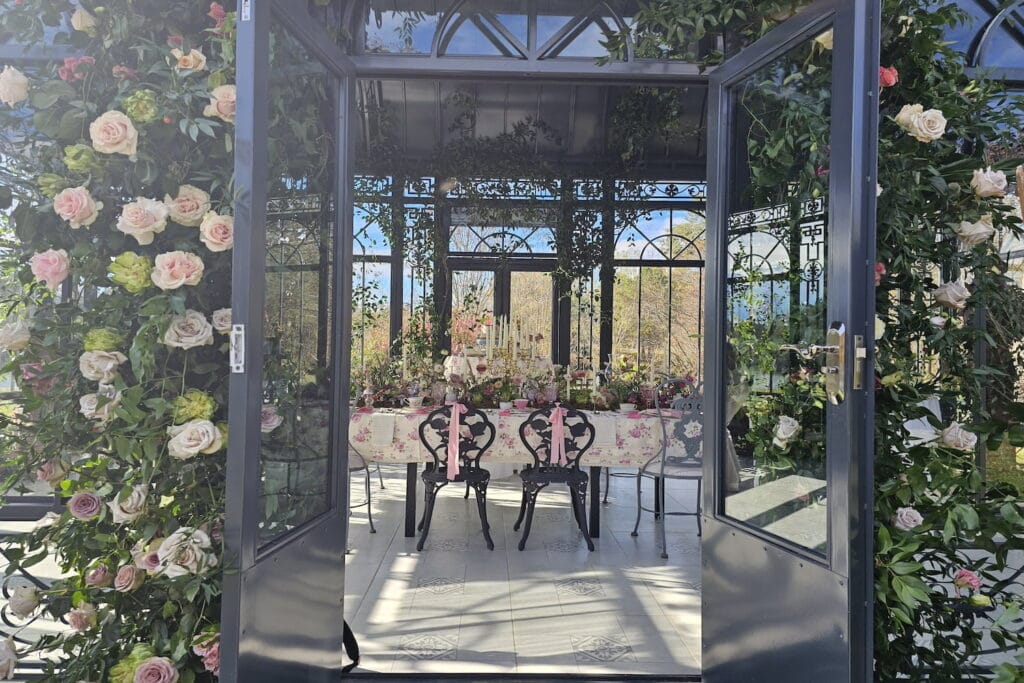
College towns in the Triangle are lively, but their busy calendars can overwhelm guests. A structured weekend plan keeps the experience smooth. By turning a wedding into a multi‑day celebration, couples can highlight local culture while ensuring guests aren’t stressed by logistics.
Friday: arrivals + easy eats
Host a casual welcome dinner at a brewery with food trucks or guide guests through a Franklin Street taco crawl. It sets the tone without straining the budget. Sharing maps and itineraries helps travelers settle in quickly.
Saturday: ceremony, portraits, and a walkable reception
Combine a museum or garden ceremony with a downtown loft reception. Add a late‑night biscuit bar to keep guests fueled and happy. Venues within walking distance of hotels mean fewer logistics headaches.
Sunday: the goodbye that doubles as a thank‑you
Offer a farewell brunch near a campus arboretum or in Durham’s American Tobacco district. It ends the weekend with gratitude and style. Guests leave feeling like they got a taste of campus culture.
Calendar watchouts and room blocks
Book early to avoid hotel shortages during sports seasons, graduations, or move‑in weeks. Room blocks near public transit simplify logistics. Sharing a wedding website with event calendars helps guests plan.
Transit and parking sanity
Arrange shuttles, designate rideshare zones, and provide maps for older guests. These steps reduce stress and keep timelines tight. Accessible planning ensures all guests, from college friends to grandparents, enjoy themselves.
A college‑town wedding becomes a highlight when logistics are handled and guests feel welcomed at every turn. Done right, it feels more like a festival than a scheduling nightmare.
NC weddings shine brighter without Airbnb
Your wedding is too important to risk on a workaround. By choosing venues built to celebrate love, you gain flexibility, budget freedom, and peace of mind. This guide has walked through the pitfalls of Airbnb rentals, shown how Peerspace offers clarity and vendor freedom, and explored the unique flavors of North Carolina regions, from Asheville’s mountains to OBX beaches. With detailed playbooks, budgeting strategies, and guest‑friendly logistics, you have the tools to shape a celebration that runs smoothly, feels authentic, and creates lasting memories. Explore Peerspace to find your perfect North Carolina wedding venue.
Get together somewhere better
Book thousands of unique spaces directly from local hosts.
Explore SpacesShare your space and start earning
Join thousands of hosts renting their space for meetings, events, and photo shoots.
List Your Space



